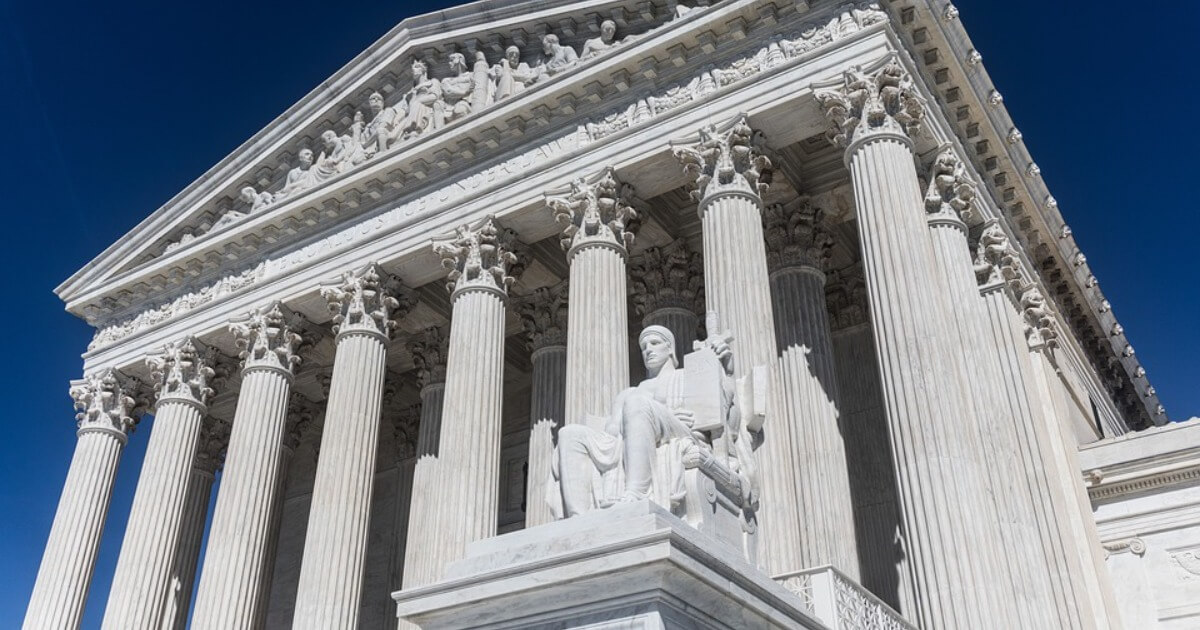Mr. Leahy, Why Not Go to the Supreme Court?
The German legal system offers a perfect way out of a great U.S. legal conundrum during Trump’s second impeachment trial.
February 9, 2021

It is obvious that there is a big gap between U.S. constitutional provisions on impeachment and an effective guarantee of a properly reasoned judgment in the case of real criminal abuses inside the political system — such as insurrection.
Evidently, the founding fathers in their day had a strong moral compass. For them, it would have been a foregone conclusion that anyone exhibiting Donald Trump’s behavior on January 6, 2021, would have been removed from office.
Avoiding a vote on the substance of the charges
In our time, things are different. Not only does the impeachment procedure usually end up in party-line votes — as was the case both in the Clinton impeachment case and in Trump’s first impeachment.
What’s much worse is that the Republican members of the U.S. Senate are doing all they can to avoid answering the core question about the legality of Trump’s behavior on January 6, 2021.
45 Republican Senators are on record through a vote that, because Trump is no longer the sitting U.S. president, they deem the impeachment trial unconstitutional.
In essence, they are ducking answering in substance what probably is one of the most important questions in the entire course of U.S. democracy to date.
The U.S. public — and the world — have a right to know whether or not a U.S. President potentially inciting his supporters to storm the U.S. Capitol is an offense that leads to permanent removal from office or not.
Simply put, if this isn’t an impeachable offense, what will ever be one?
Sinking to the level of Putin’s kangaroo court
The lower the Republican Party stoops in its subservience to Mr. Trump, the more debased — de facto the more Putin-like — U.S. decision-making will be perceived globally.
Truth be told, the totally egregious miscarriage of justice by Pipeline Putin’s kangaroo court in the case against Alexei Navalny in Moscow is of the very same ilk as the totally perverted faithfulness with which Republicans toe Trump’s line.
U.S. Senators have an opinion on EVERYTHING
U.S. Senators make it their living — and daily practice — to basically opine on the substance of any and all matters — including those issues about which they understand little.
The saying that there are 100 people in the U.S. Senate who deem themselves the U.S. Secretary of State is no joke.
That is why it is so strange for Republicans to seek a purely procedural answer to a most vital material issue — one that directly concerns the entire edifice of U.S. democracy.
What can be done?
Clarifying that issue of whether or not impeachment proceedings can still progress in this particular case should be mandatory for a simple reason: The whole idea behind using the avenue of impeachment is that the political branch should be enabled to police itself.
The founding fathers, self-cleansing oriented as they certainly were at the time, believed in impeachment to put brakes on a potential overreach of the judicial branch into the political branch.
That approach, however, requires that the political class cannot easily game the impeachment system for its own convenient use.
The question is, what can be done to avoid the travesty of ducking?
The German approach
The German legal system offers an effective way to deal with this. In legal proceedings that involve core constitutional questions, the practice is that the case is halted at whatever court and the very specific constitutional issue in question is presented to the country’s constitutional court for resolution.
The same should be done in the United States right now. The material question that should be put directly before the U.S. Supreme Court is to decide the question of whether leaving office really ends any and all possibility of impeachment proceedings.
The presiding officer of the impeachment trial, in this case Senator Leahy, should therefore halt the proceedings and ask the full Supreme Court to review the constitutionality of the proceedings.
The issue for the U.S. Supreme Court
Unless the Supreme Court is given a chance to weigh in, the political perversion of a party-line driven miscarriage of any reasonable form of justice will be cemented even more.
As to the potential decision of the U.S. Supreme Court, there is a very reasonable argument to be made — and to be considered by the nine Justices – that, in this particular case at least, impeachment should be considered possible even after departure from office.
It concerns, after all, a case that involves the very foundation of democracy itself — i.e., whether a President can actively call for insurrection.
In such a case, the purely formalistic argument that a president no longer holding the office ends the applicability of the impeachment proceeding should not carry the day.
Therefore, in the case of such a high crime, a now former President should forever be disqualified from running for the country’s highest office. That should actually go without saying.
On substance, still the Senate’s decision
Note that, even in this scenario, the decision on the material substance — guilty or not? — would not be the Supreme Court’s, but still the U.S. Senate’s.
As to the potential outcome of this scenario, there is of course a possibility that the Supreme Court will rule 6:3 or 5:4 — pretty much in party line fashion – that impeachment is no longer possible.
That would put the court’s majority on the record with a tremendous miscarriage of justice, in line with some of the worst Supreme Court decisions of the past — such as Dred Scott and Plessy vs. Ferguson.
Alternatively, if the Supreme Court does the right thing, that would put all Republican Senators on the spot.
The Senate must vote on the substance
Senators would have to decide with their vote on the substance of the trial whether their fealty to Trump — or their acceptance of being unshakably intimidated by him — would gain the upper hand.
If Republican Senators were to decide in Trump’s favor, they would pretty much issue a license to future Presidents — and insurrectionists — to go out and kill the members of the U.S. Congress. Quite a few particularly blinded or benighted Republican Senators would likely do that.
Their names would, on the record, forever live in infamy in the minds of democratic citizens globally. They should become persona non grata for travel to all democratically run countries.
The odds are that, if the U.S. Supreme Court could force their hand, a significant share of Republican Senators would come to their senses.
Conclusion
Other than achieving clarity, an important reason for the validity of such an approach is that it does not allow elements of the political class — in this case, the Trump wing of the Republican Party — to duck answering the very serious issue of how to deal with an ex-president who acted in an insurrectionist manner while still in office.
Unfortunately, the ability to duck the real issue is currently the most likely outcome in the United States. It makes a mockery of impeachment — which in its net result is no better than the insurrectionist act committed on January 6, 2021 itself.
Takeaways
For the founding fathers, anyone exhibiting Trump’s behavior on January 6, 2021 would have been removed from office.
The founding fathers believed in impeachment to put brakes on a potential overreach of the judicial branch into the political branch.
Many Republican Senators are ducking answering what probably is one of the most important questions in the entire course of US democracy.
The lower the Republican Party stoops in its subservience to Trump, the more debased – or more Putin-like – US decision-making will be perceived globally.
Unless the Supreme Court is given a chance to weigh in, the political perversion of a party-line driven miscarriage of justice will be cemented even more.
If Republicans were to decide in Trump’s favor, they would issue a license to future Presidents -- and insurrectionists -- to go out and kill members of Congress.

